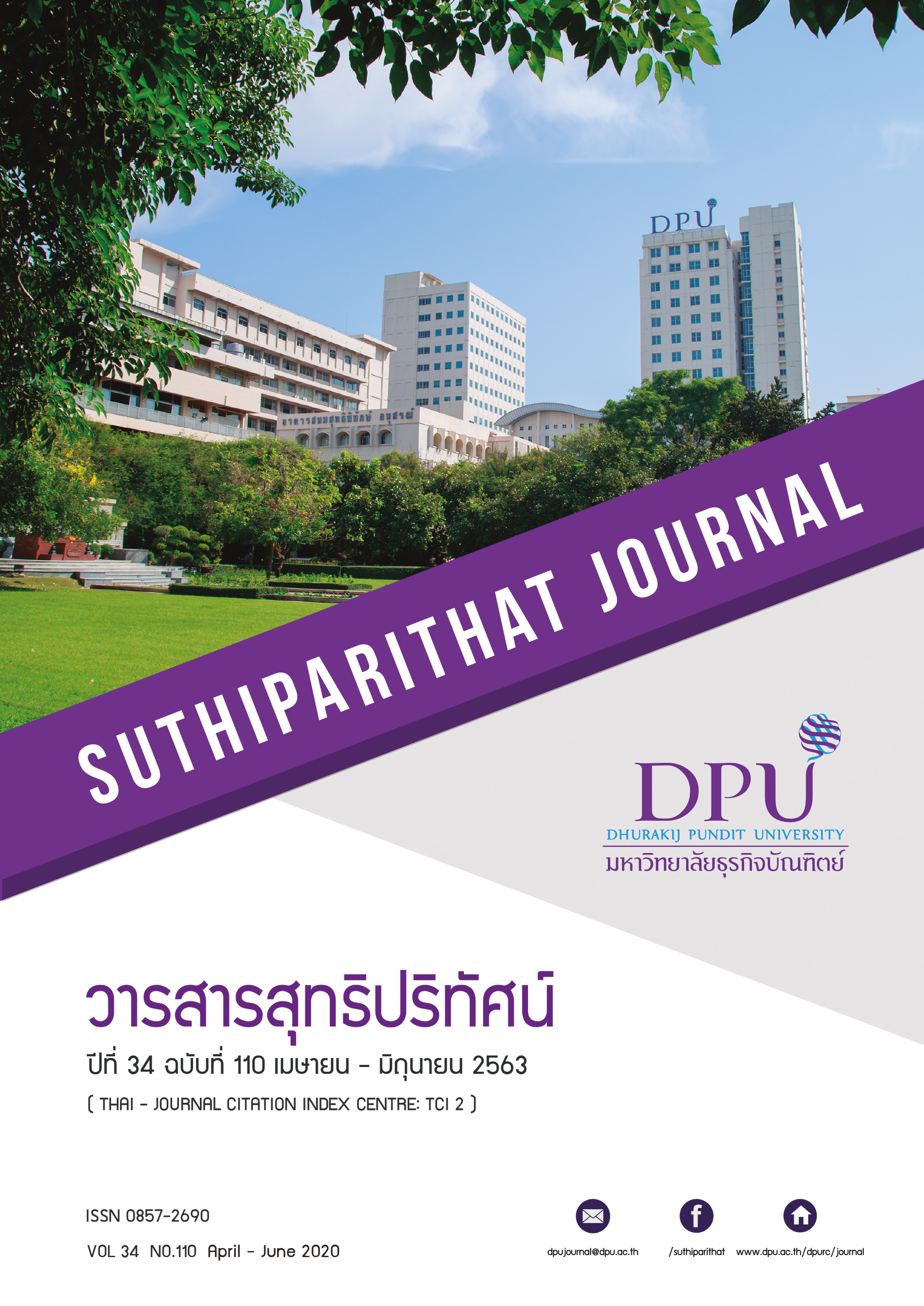ความสัมพันธ์ระหว่างกำไรขาดทุนเบ็ดเสร็จกับมูลค่าของกิจการตามราคาตลาด
คำสำคัญ:
กำไรขาดทุน, กำไรขาดทุนเบ็ดเสร็จ, กำไรขาดทุนเบ็ดเสร็จอื่น, มูลค่าของกิจการตามราคาตลาดบทคัดย่อ
งานวิจัยเรื่อง ความสัมพันธ์ระหว่างกำไรขาดทุนเบ็ดเสร็จกับมูลค่าของกิจการตามราคาตลาด มีวัตถุประสงค์หลักเพื่อ 1) ศึกษาความสัมพันธ์ระหว่างกำไรขาดทุนเบ็ดเสร็จกับมูลค่าของกิจการตามราคาตลาด 2) ศึกษาความสัมพันธ์เชิงเปรียบเทียบระหว่างกำไรขาดทุนและกำไรขาดทุนเบ็ดเสร็จกับมูลค่าของกิจการตามราคาตลาดรวมถึงความสัมพันธ์ส่วนเพิ่มของกำไรขาดทุนเบ็ดเสร็จอื่นกับมูลค่าของกิจการตามราคาตลาด และ 3) ศึกษาปัจจัยที่มีผลกระทบต่อความสัมพันธ์ระหว่างกำไรขาดทุนเบ็ดเสร็จกับมูลค่าของกิจการตามราคาตลาด
งานวิจัยนี้เป็นงานวิจัยเชิงประจักษ์ โดยกลุ่มตัวอย่างที่ใช้ในการศึกษาคือบริษัทจดทะเบียนในตลาดหลักทรัพย์แห่งประเทศไทยในปี 2556-2560 ผลการศึกษาพบว่ากำไรขาดทุนเบ็ดเสร็จ และบางองค์ประกอบของกำไรขาดทุนเบ็ดเสร็จอื่น ได้แก่ ผลกำไรขาดทุนจากการแปลงค่างบการเงินของหน่วยงานต่างประเทศ และกำไรขาดทุนจากการวัดมูลค่าเงินลงทุนเผื่อขายมีความสัมพันธ์กับมูลค่าของกิจการตามราคาตลาด ในประเด็นความสัมพันธ์เชิงเปรียบเทียบพบว่ากำไรขาดทุนมีความสัมพันธ์กับมูลค่าของกิจการตามราคาตลาดมากกว่ากำไรขาดทุนเบ็ดเสร็จ และประเด็นความสัมพันธ์ส่วนเพิ่มไม่พบหลักฐานว่ากำไรขาดทุนเบ็ดเสร็จอื่นก่อให้เกิดความสัมพันธ์ส่วนเพิ่มกับมูลค่าของกิจการตามราคาตลาด ในส่วนของปัจจัยที่มีผลกระทบต่อความสัมพันธ์ระหว่างกำไรขาดทุนเบ็ดเสร็จกับมูลค่าของกิจการตามราคาตลาด ผลการศึกษาพบว่าความมีสาระสำคัญของกำไรขาดทุนเบ็ดเสร็จอื่นและการใช้ดุลยพินิจต่อรายการกำไรขาดทุนเบ็ดเสร็จอื่นเป็นปัจจัยที่มีผลกระทบต่อความสัมพันธ์ของกำไรขาดทุนเบ็ดเสร็จกับมูลค่าของกิจการตามราคาตลาด
เอกสารอ้างอิง
กัลยรัตน์ บุญประเสริฐ. (2559). ความสัมพันธ์ระหว่างความผันผวนของกำไรขาดทุนเบ็ดเสร็จและราคาหุ้น กรณีศึกษาบริษัทจดทะเบียนในตลาดหลักทรัพย์แห่งประเทศไทย (การค้นคว้าอิสระปริญญามหาบัณฑิต). กรุงเทพฯ: มหาวิทยาลัยธรรมศาสตร์. สืบค้นจาก http://tdc.thailis.or.th/tdc/
กอบแก้ว ชุมสาย ณ อยุธยา. (2550). คุณภาพของกำไร: ผลกระทบต่อมูลค่าของกิจการ (การค้นคว้าอิสระปริญญามหาบัณฑิต). กรุงเทพฯ: มหาวิทยาลัยธรรมศาสตร์. สืบค้นจาก http://tdc.thailis.or.th/tdc/
กฤตพงศ์ วัชระนุกุล, และกนกอร แก้วประภา. (2551). ความสัมพันธ์ระหว่างข้อมูลองค์ประกอบกำไรและราคาหลักทรัพย์ของบริษัทจดทะเบียนในตลาดหลักทรัพย์แห่งประเทศไทย. วารสารปาริชาติ, 28(3), 230-249.
นันทิยา พรมทอง. (2550). ความสัมพันธ์ระหว่างรายการกำไรขาดทุนที่ต้องรับรู้โดยตรงไปยังส่วนของเจ้าของและอัตราผลตอบแทนของหุ้นบริษัทจดทะเบียนในตลาดหลักทรัพย์แห่งประเทศไทย. สืบค้นจาก http://tdc.thailis.or.th/tdc/
ปัญญา สัมฤทธิ์ประดิษฐ์. (2545). การศึกษาปัจจัยที่มีผลกระทบต่อความสามารถของกำไรทางบัญชีและมูลค่าตามบัญชีในการใช้อธิบายราคาหลักทรัพย์หุ้นสามัญในตลาดหลักทรัพย์แห่งประเทศไทย (ปริญญานิพนธ์ปริญญาดุษฎีบัณฑิต). กรุงเทพฯ: จุฬาลงกรณ์มหาวิทยาลัย. สืบค้นจาก http://tdc.thailis.or.th/tdc/
ภาพร เอกอรรถพร. (2552). มิติใหม่ของงบกำไรขาดทุน. วารสารวิชาชีพบัญชี, 5(13), 20-24.
สภาวิชาชีพบัญชีในพระบรมราชูปถัมภ์. (2558). กรอบแนวคิดสำหรับการรายงานทางการเงิน (ปรับปรุง 2558). กรุงเทพฯ: ผู้แต่ง.
สภาวิชาชีพบัญชีในพระบรมราชูปถัมภ์. (2560). มาตรฐานการบัญชี ฉบับที่ 1 (ปรับปรุง 2560) เรื่อง การนำเสนองบการเงิน. กรุงเทพฯ: ผู้แต่ง.
Biddle, G. C., & Choi, J. H. (2006). Is comprehensive income useful?. Journal of Contemporary Accounting & Economics, 2(1), 1-32.
Brimble, M., & Hodgson, A. (2005). The value relevance of comprehensive income and components for industrial firms. Working Paper. Amsterdam Business School.
Cahan, S. F., Courtenay, S. M., Gronnewoller, P. L., & Upton, D. R. (2000). Value relevance of mandated comprehensive income disclosures. Journal of Business Finance & Accounting, 27(9-10), 1233-1265.
Chambers, D., Linsmeier, T. J., Shakespeare, C., & Sougiannis, T. (2007). An evaluation of SFAS No. 130 comprehensive income disclosures. Review of Accounting Studies, 12(4), 557-593.
Cheng, C. S. A., & Cheung, J. K. (1993). On the usefulness of operating income, net income, and comprehensive income in explaining security returns. Accounting and Business Research, 23(91), 195-203.
Collins, D. W., Maydew, E. L., & Weiss, I. S. (1997). Changes in the value-relevance of earnings and book values over the past forty years. Journal of Accounting and Economics, 24(1), 39-67.
Dhaliwal, D., Subramanyam, K. R., & Trezevant, R. (1999). Is comprehensive income superior to net income as a measure of firm performance?. Journal of Accounting and Economics, 26(1-3), 43-67.
Ernstberger, J. (2008). The value relevance of comprehensive income under IFRS and US GAAP: Empirical evidence from Germany. International Journal of Accounting, Auditing and Performance Evaluation, 5(1), 1-29.
Goncharov, I., & Hodgson, A. (2011). Measuring and reporting income in Europe. Journal of International Accounting Research, 10(1), 27-59.
Günther, R. (2015). Value-relevance of other comprehensive income under IFRS (Doctoral Dissertation, University of St. Gallen, Switzerland). Retrieved from https://www1.unisg.ch/www/edis.nsf/SysLkpByIdentifier/4386/$FILE/dis4386.pdf.
Hodder, L. D., Hopkins, P. E., & Wahlen, J. M. (2006). Risk-relevance of fair-value income measures for commercial banks. The Accounting Review, 81(2), 337-375.
Holstrum, G. L., & Messier Jr, W. F. (1982). A review and integration of empirical research on materiality. Auditing: A Journal of Practice & Theory, 2(1), 45-63.
Jordan, C. E., & Clark, S. J. (2002). Comprehensive income: how is it being reported and what are its effects?. Journal of Applied Business Research, 18(2), 1-8.
Kanagaretnam, K., Mathieu, R., & Shehata, M. (2009). Usefulness of comprehensive income reporting in Canada. Journal of Accounting and Public Policy, 28(4), 349-365.
Khan, S. (2012). Volatility, value relevance and predictive power of comprehensive income (Doctoral Dissertation, Massey, New Zealand). Retrieved from https://mro.massey.ac.nz/bitstream/handle/.
Khan, S., & Bradbury, M.E. (2016). The volatility of comprehensive income and its association with market risk. Accounting and Finance, 56, 727-748.
Kreuze, J. G., & Newell, G. E. (1999). The relationship of net income to comprehensive income: An analysis of Fortune 500 companies. American Journal of Business, 14(1), 53-58.
Kubota, K., K. Suda, & H. Takehara. (2006). Reporting of the net income plus other comprehensive income: Information content test of the Japanese firms. Working paper, Musashi University.
Kubota, K., Suda, K., & Takehara, H. (2011). Information content of other comprehensive income and net income: evidence for Japanese firms. Asia-Pacific Journal of Accounting & Economics, 18(2), 145-168.
Lee, C., & Park, M. S. (2013). Subjectivity in fair-value estimates, audit quality, and informativeness of other comprehensive income. Advances in Accounting, 29(2), 218-231.
Mechelli, A., & Cimini, R. (2014). Is comprehensive income value relevant and does location matter? A European study. Accounting in Europe, 11(1), 59-87.
Ohlson, J. A. (1995). Earnings, book values, and dividends in equity valuation. Contemporary Accounting Research, 11(2), 661-687.
Primavera, L., & Hidayat, T. (2015). The effects of audit quality on the value relevance of other comprehensive incomes. Journal of Economics, Business & Accountancy Ventura, 18(1), 145-154.
Schroder, L. B. (2009). The materialty and volatility of comprehennsive income (Master’s thesis). New Zealand: Massey University. Retrieved from https://mro.massey.ac.nz/bitstream/handle/.
Semba, H. D. (2017). Does recycling improve information usefulness of income? The case of Japan. Asian Review of Accounting, 25(3), 376-403.
Wang, Y., Buijink, W., & Eken, R. (2006). The value relevance of dirty surplus accounting flows in The Netherlands. The International Journal of Accounting, 41(4), 387-405.
ดาวน์โหลด
เผยแพร่แล้ว
รูปแบบการอ้างอิง
ฉบับ
ประเภทบทความ
สัญญาอนุญาต
เนื้อหาและข้อมูลในบทความที่ลงตีพิมพ์ในวารสารสุทธิปริทัศน์ ถือเป็นข้อคิดเห็นและความรับผิดชอบของผู้เขียนบทความโดยตรงซึ่งกองบรรณาธิการวารสาร ไม่จำเป็นต้องเห็นด้วย หรือร่วมรับผิดชอบใด ๆ
บทความ ข้อมูล เนื้อหา รูปภาพ ฯลฯ ที่ได้รับการตีพิมพ์ในวารสารสุทธิปริทัศน์ ถือเป็นลิขสิทธิ์ของวารสารสุทธิปริทัศน์หากบุคคลหรือหน่วยงานใดต้องการนำทั้งหมดหรือส่วนหนึ่งส่วนใดไปเผยแพร่ต่อหรือเพื่อกระทำการใด ๆ จะต้องได้รับอนุญาตเป็นลายลักษณ์อักษรจากวารสารสุทธิปริทัศน์ก่อนเท่านั้น







